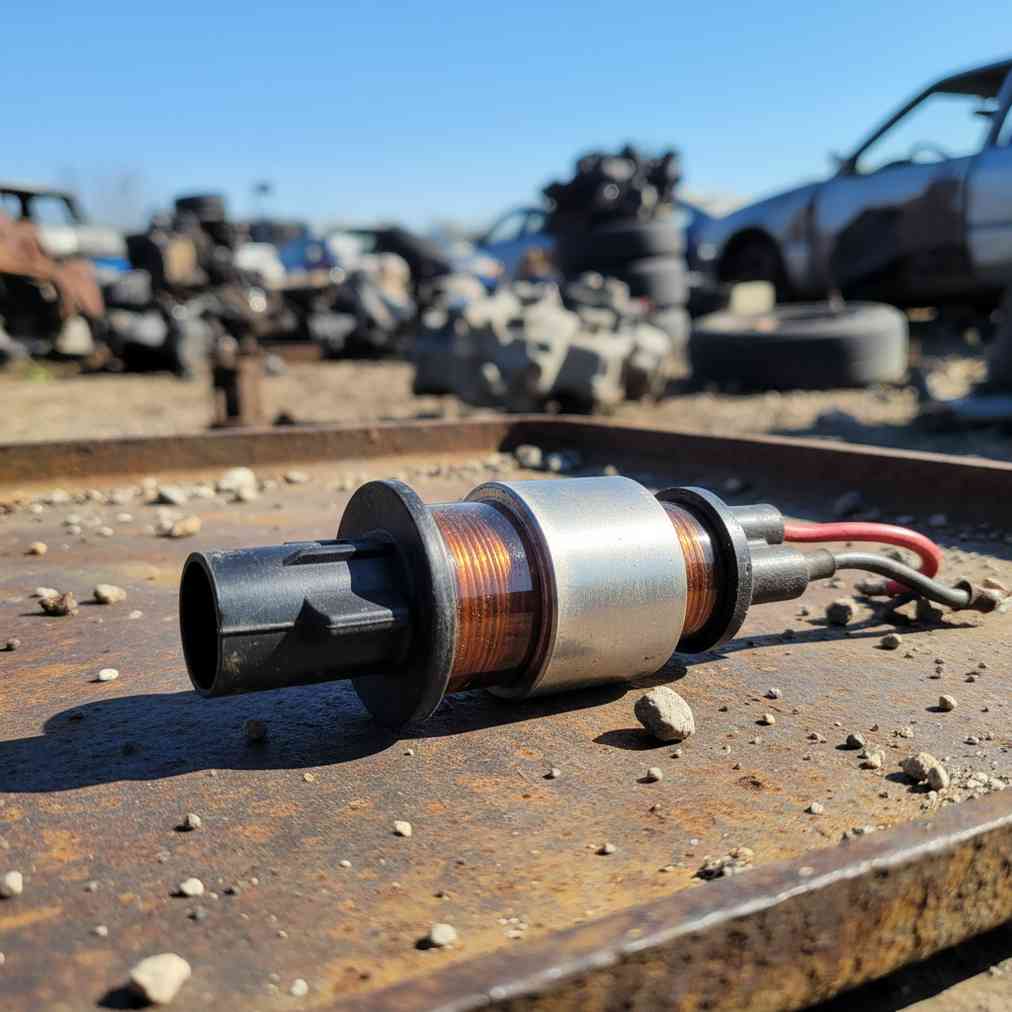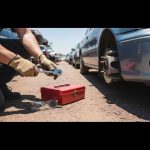Understanding Ignition Coils and Their Critical Role
Ignition coils are the unsung heroes of your vehicle’s engine system, converting your car’s 12-volt battery power into the high-voltage spark (typically 15,000-40,000 volts) needed to ignite the fuel-air mixture in your engine’s combustion chambers. When these crucial components fail, your vehicle can experience a cascade of performance issues that range from annoying to completely debilitating.
With new ignition coils costing between $150 and $300 (not including labor), many car owners are turning to used ignition coils from junkyards as a cost-effective alternative. However, buying used ignition coils requires careful consideration and thorough testing to ensure reliability.
Signs Your Ignition Coil Is Failing
Before heading to the junkyard, it’s essential to confirm that your ignition coil is indeed the culprit. Check engine lights are often the first indicator, but several other symptoms can point to coil failure:
- Check Engine Light: Diagnostic trouble codes P0351-P0362 specifically indicate ignition coil circuit malfunctions
- Engine Misfiring: Rough idle, shaking, or stuttering during acceleration
- Difficulty Starting: Weak or absent spark leads to hard starts or no-start conditions
- Engine Backfiring: Unburned fuel igniting in the exhaust system
- Vehicle Stalling: Irregular sparks causing engine shutdown, especially at lower speeds
- Reduced Power and Fuel Economy: Incomplete combustion resulting in sluggish performance
- Fuel Smell from Exhaust: Rich fuel mixture from misfires creating noticeable odors
Common Causes of Ignition Coil Failure
Understanding why ignition coils fail can help you make better decisions when shopping for used auto parts. The most common failure causes include:
| Cause | Description | Prevention |
|---|---|---|
| Worn Spark Plugs | Forces coils to work harder, increasing failure risk | Regular spark plug maintenance at recommended intervals |
| Electrical Issues | Bad grounds, weak batteries, or faulty alternators | Maintain proper electrical system health |
| Heat and Vibration | Prolonged exposure degrades coils over time | Ensure proper engine mounting and cooling |
| Moisture Contamination | Oil or coolant leaks causing shorts and corrosion | Address leaks promptly and keep connections clean |
| Normal Wear | Insulation degradation leading to overheating | Replace at manufacturer intervals (~50,000 miles) |
Testing a Used Ignition Coil Before Purchase
As experts on automotive forums often note, ignition coils are typically “binary” components – they either work or they don’t. However, thorough testing is crucial before making a purchase. Here’s how to properly test a used ignition coil:
Visual Inspection
- Check for Physical Damage: Look for cracks, burn marks, or melted plastic
- Inspect Connectors: Ensure terminals are clean and free from corrosion
- Examine the Boot: Check for tears or damage that could allow moisture intrusion
- Verify Part Numbers: Confirm exact compatibility with your vehicle
Multimeter Testing
A digital multimeter is essential for testing used ignition coils. Follow these steps for accurate readings:
- Primary Resistance Test: Set multimeter to ohms (Ω), connect probes to primary terminals. Healthy readings typically range between 0.4-2 ohms
- Secondary Resistance Test: Connect one probe to primary terminal, other to output terminal. Good coils read 6,000-10,000 ohms (some sources suggest 7,500-10,500 ohms)
- Consult Vehicle Manual: Resistance specifications vary significantly between makes and models
Spark Test
If multimeter readings are within specification but you still have concerns, perform a spark test:
- Install the coil temporarily in your vehicle
- Connect a spark tester to the coil output
- Crank the engine and observe the spark quality
- Look for a strong, consistent blue spark
OEM vs. Aftermarket: Making the Right Choice
When shopping for used ignition coils, understanding the difference between OEM and aftermarket parts is crucial for making an informed decision.
OEM (Original Equipment Manufacturer) Coils
- Exact Specifications: Manufactured to precise vehicle requirements
- Guaranteed Fit: No compatibility issues with connectors or mounting
- Superior Quality: Built to original standards with proven materials
- Longer Lifespan: Typically more durable than aftermarket alternatives
- Higher Cost: Generally more expensive, even when used
Aftermarket Coils
- Variable Quality: Ranges from excellent to poor depending on manufacturer
- Cost-Effective: Usually less expensive than OEM parts
- Research Required: Must verify brand reputation and compatibility
- Potential Issues: Cheaper versions may fail prematurely
Expert Tip: When buying used, prioritize OEM parts whenever possible. The proven reliability and exact fit make them worth the potential extra cost, especially considering the common car problems that can result from subpar ignition components.
Where to Find Quality Used Ignition Coils
Not all junkyards are created equal when it comes to high-quality auto parts. Here are the best sources for used ignition coils:
Reputable Salvage Yards
- Pull-A-Part Locations: Nationwide chain with standardized quality processes
- LKQ Pick Your Part: Large inventory with organized sections
- Local Auto Recyclers: Often have detailed knowledge of their inventory
- Specialized Import Yards: For foreign vehicle brands
For those in specific areas, consider checking out junkyards in Los Angeles or exploring South Florida salvage yards for their extensive inventories.
When NOT to Buy Used Ignition Coils
While used ignition coils can offer significant savings, certain situations call for new parts:
| Situation | Recommendation | Reason |
|---|---|---|
| No Warranty Available | Consider New | Risk of immediate failure with no recourse |
| Unknown Vehicle History | Proceed with Caution | Previous maintenance affects part reliability |
| Critical Reliability Needed | Buy New | Daily driver or work vehicle dependency |
| Difficult Access Location | Buy New with Warranty | High labor costs for future replacement |
| Minimal Cost Difference | Choose New | Better value proposition for peace of mind |
Cost Analysis: Used vs. New Ignition Coils
Understanding the true cost of used versus new ignition coils involves more than just the purchase price. Buying guides suggest considering these factors:
- New OEM Coils: $100-$300 per coil with 1-3 year warranty
- New Aftermarket: $40-$150 per coil with varying warranty periods
- Used OEM: $25-$75 per coil, typically no warranty
- Used Aftermarket: $15-$50 per coil, higher failure risk
Labor costs for ignition coil replacement can range from $50-$200 depending on your vehicle’s design and local labor rates. This makes reliability a crucial factor in your decision.
Installation Tips for Used Ignition Coils
Proper installation is crucial for getting the best performance from your used ignition coil. Here are essential tools and tips:
Pre-Installation Checklist
- Clean the Installation Area: Remove dirt and debris from coil mounting area
- Inspect Spark Plugs: Replace if worn to prevent premature coil failure
- Check Wiring Harness: Ensure all connections are clean and tight
- Apply Dielectric Grease: Prevent moisture intrusion at connections
Common Installation Mistakes
- Using the wrong torque specifications for mounting bolts
- Failing to properly seat electrical connections
- Installing coils without addressing underlying issues
- Mixing different coil brands on the same engine
Maintenance Tips to Extend Ignition Coil Life
Whether you purchase used or new ignition coils, proper car maintenance can significantly extend their lifespan:
- Regular Spark Plug Replacement: Follow manufacturer intervals (typically 30,000-50,000 miles)
- Address Oil Leaks Promptly: Prevent contamination of electrical connections
- Maintain Proper Engine Timing: Incorrect timing stresses ignition components
- Keep Connections Clean: Periodically inspect and clean electrical connections
- Monitor Engine Performance: Address misfires and rough running immediately
Alternative Solutions and Related Parts
If you’re having trouble finding the right used ignition coil, consider these related components that might also need attention:
- Spark Plugs: Often replaced simultaneously with coils
- Wiring Harnesses: May be the actual source of ignition problems
- ECU/PCM: Computer control modules can cause coil-related codes
- Fuel System Components: Poor fuel delivery can stress ignition systems
For comprehensive engine work, you might also need other components like used starters or fuel pumps from salvage yards.
Making Your Final Decision
Buying a used ignition coil can be a smart financial decision when done correctly. The key factors for success include:
- Thorough Testing: Never skip the multimeter and visual inspection
- OEM Preference: Choose original equipment when available
- Reputable Sources: Buy from established salvage yards with good reputations
- Realistic Expectations: Understand the risks and plan accordingly
- Professional Installation: Consider having a qualified technician install the part
Remember that ignition coils typically fail around 50,000 miles, but this can vary significantly based on driving conditions and maintenance history. By following the guidelines in this comprehensive guide, you can successfully purchase and install a used ignition coil that provides reliable service while saving money on your vehicle repairs.
For more information about finding quality used auto parts and maximizing your junkyard visits, explore our extensive auto parts and junkyard resource center.





Leave a Reply
You must be logged in to post a comment.